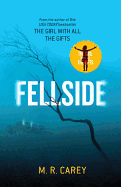
A young boy is dead. Alex Beech was 10 years old, and home alone when his apartment building caught fire. The coroner's report was conclusive: death by smoke inhalation, his body gruesomely if predictably distorted by the raging fire that melted the plastic playhouse where he sought shelter in the final moments of his life. Within days of the fire, the police and the public have come to the conclusion that his death was no accident. Alex was an unintended murder victim, and Jess Moulson is the one who killed him.
Tragedy hunted Jess from the start. Her father was a raging alcoholic who "crashed and raged in the maze of her childhood memories like an intermittent minotaur." Her mother, Paula, was as addicted to him as he was to the bottle, and Jess was raised picking up the pieces of their tumultuous relationship. Wary of the slippery slope, Jess studiously avoided anything which might grow into a habit until a broken collarbone got her an Oxycodone prescription. Oxy led to heroin, which led to a dirty flat in North London where she and her boyfriend, John, slowly liquidated their belongings, collapsing one vein after another as they shot up their dwindling funds.
Alex was Jess's upstairs neighbor, the only child of a couple who spent the little time they were at home in screaming matches with their son and with each other. As the prosecution presented it, the evidence was clear: Jess and John had fought. Jess, high and out of her mind with anger, set the apartment ablaze with the intent to kill her boyfriend. He escaped, she was rescued from the flames in the depths of an opiate fog, and Alex was the fire's only victim.
Unable to remember the events of that night, Jess becomes so convinced of her own guilt that she decides to kill herself, refusing food for weeks on end as she wastes away in the Fellside prison infirmary. As Jess's body atrophies and her vital functions weaken, Alex begins to visit. He wanders through her dreams, begging her for help. She didn't kill him, he says, but she can find out who did. There was a nice girl, he says, who protected him, and a mean one who hurt him. Jess sees a chance for redemption, or maybe vengeance. She believes that if she can bring Alex justice, she will have done at least one selfless thing in her life. And so she decides to live.
Outside the infirmary, Fellside makes Orange Is the New Black look like summer camp. A private women's prison on the Yorkshire moors, it's an evil place where addiction and corruption darken every interaction. When Jess is healthy enough to enter the prison population, she's sent to the maximum-security wing, known officially as Goodall and locally as the State of Grace. Harriet Grace is at the top of Goodall wing's twisted food-chain, controlling the flow of illicit materials in and out of the wing with the help of a crew of shank-wielding flunkies. No perceived slight to her authority is too small, and no punishment too harsh.
M.R. Carey's (The Girl with All the Gifts) prose is elegant and streamlined, with occasional lush imagery bubbling up out of the darkness. When Alex visits Jess, he comes at night, walking with her through a dream world where the thoughts and souls of the other prisoners flicker like candle flames. Jess wanders among them, unaware at first of the effect she is having on the fires she touches. And then Fellside starts to dream. The inmates of G-block dream about Jess, and they dream about Alex, and they are afraid. In Fellside, the world of dreams is as real as the waking world, and what Jess does there will have the furthest-reaching consequences of all.
Carey's novel is dark, much darker than many thrillers that feature more brutal crimes or more explicitly evil villains. The ecosystem of addiction and coercion is far stronger than any individual's desire to do the right thing. The only true power the characters wield is the power to choose the circumstances of their own death. When Grace decides she wants to expand her illicit business into other cell blocks, she enlists Jess and the prison doctor as mules. Grace brings Jess in line with the help of Liz Earnshaw, a violent and volatile woman who acts as her attack dog. Neither Jess nor the doctor is interested in abetting her abhorrent trade, and yet every attempt to resist ends in bloodshed.
Fellside's appeal lies in its unflinching depiction of powerlessness. There are no authorities waiting in the wings to end the madness. There is nowhere to hide. It is a crushing, enthralling fantasy, tugging at a deep-seated fear--that something which comes in a pill or a glass could bring the trappings of civilization crashing down around us, that all our best intentions mean nothing at all. There are characters, like Jess and the doctor, who wish sincerely to do the right thing. There are others, like Grace and Devlin, a crooked warder, interested in nothing but themselves. Most interesting of all are those in the middle, like Liz Earnshaw, whose motives remain for the most part unfathomable. For all of them, however, the answer is the same. There is no doing the "right thing," only following the path set before them or perishing in the name of protest. --Emma Page

